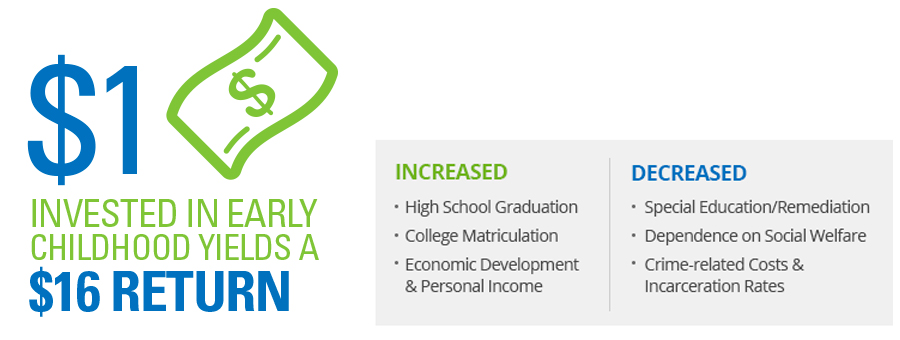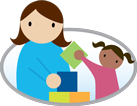Investing in early childhood means funding proven programs and innovative strategies for children from birth to age 5 that:
- Strengthen families in their role as their child’s first teacher
- Improve the quality of early learning environments like preschool and child care, and expand access to those programs
- Promote prevention and early identification of health problems that can impact learning later on

Research by Nobel Prize-winning economist James Heckman showed that every $1 invested in quality early childhood programs can yield returns between $4 and $16.
Ready for School, Set for Life
A child’s early years hold the key to their success — and Arizona’s — because children who are healthy and prepared when they enter kindergarten do better in school and are more likely to graduate and enroll in college. And well-educated adults are more prepared for the job opportunities of a global marketplace and to contribute to the strength of their communities.
Numerous studies have demonstrated that children with access to quality early learning are more prepared for kindergarten. They have increased vocabulary, better language, math and social skills, more positive relationships with classmates, and they score higher on school-readiness assessments. And as they go forward in school and life, they are less likely to need special education services or be held back a grade, and are more likely to graduate and go on to college. These are better outcomes for kids that also save taxpayers money.
 If families and caregivers can provide quality early childhood development, then children will start school ready to learn. Early experiences promote future learning, behavior and health.
If families and caregivers can provide quality early childhood development, then children will start school ready to learn. Early experiences promote future learning, behavior and health.
 If children start school ready to learn, they are more likely to read at grade level by 3rd grade. Remedial costs go down, potential lifelong gaps could be eliminated, and our entire school system is better for all kids.
If children start school ready to learn, they are more likely to read at grade level by 3rd grade. Remedial costs go down, potential lifelong gaps could be eliminated, and our entire school system is better for all kids.
 If children read at grade level by 3rd grade, they’re more likely to graduate from high school. High school dropouts are 4x more likely to be unemployed, apply for public assistance, and make up 82% of the prison population.
If children read at grade level by 3rd grade, they’re more likely to graduate from high school. High school dropouts are 4x more likely to be unemployed, apply for public assistance, and make up 82% of the prison population.
 If children graduate from high school, they are more likely to go on to higher education. Businesses benefit from a better-educated workforce, and high school graduates also can enter the job market as tax-paying citizens.
If children graduate from high school, they are more likely to go on to higher education. Businesses benefit from a better-educated workforce, and high school graduates also can enter the job market as tax-paying citizens.
 Confident, accomplished adults contribute to a responsible community. Employable, tax-paying citizens are critical to a vital economy.
Confident, accomplished adults contribute to a responsible community. Employable, tax-paying citizens are critical to a vital economy.
74% of business leaders say a skilled workforce is the most important factor to business success.
Zogby International (2005)
School Readiness = Workforce Readiness
Allocating resources to support the health and learning of young children is a critical economic development strategy. The business community agrees, because the competitiveness of small, medium and large companies depends on having a pipeline of talented, educated employees with the skills needed in today’s economy:
- Problem-solving
- Communication
- Decision-making
- Critical thinking
- Motivation
- Collaboration
95% of CEOs indicate that their companies suffer from skills shortages.
Business Roundtable (2012). Workforce Skills Surve
In Arizona, as in most of the United States, we don’t have enough workers with the skills that employers need. Nearly half the American workforce lacks the basic education and communication skills required to get a job and advance. In addition, one quarter of Arizona’s students don’t graduate from high school. That’s the bad news. The good news, however, is that we know how to solve this problem.
“The return on investment from early childhood is extraordinary.”
Federal Reserve Bank of Minneapolis
90% of brain growth occurs before kindergarten. And the skills and abilities employers are looking for — focus, self-discipline, motivation and collaboration — all start to take root in the first five years of life. The ROI from investing in quality early childhood education programs for kids birth to age 5 is well established, with strong, positive effects on:
- Kindergarten readiness
- Language, math and social skills
- K-12 test scores
- High school graduation
- College enrollment
Investing in early childhood programs for infants, toddlers and preschoolers is the only proven strategy to produce such returns. It also correlates strongly to less crime and less dependence on social services later in life.
We know the importance of investing in early childhood. But don’t take our word for it:
U.S. Chamber of Commerce
“(T)he capacity for developmental skills begins in the first five years of life. This is the beginning point for a person’s creativity, communication, team working, problem-solving and critical thinking skills.”
The Committee for Economic Development
“Business leaders and policymakers should consider investment in young children one of the most effective strategies to secure the future economic strength of their communities and the nation.”
The Business Roundtable
“America’s continuing efforts to improve education and develop a world-class workforce will be hampered without a commitment to early childhood education.”

